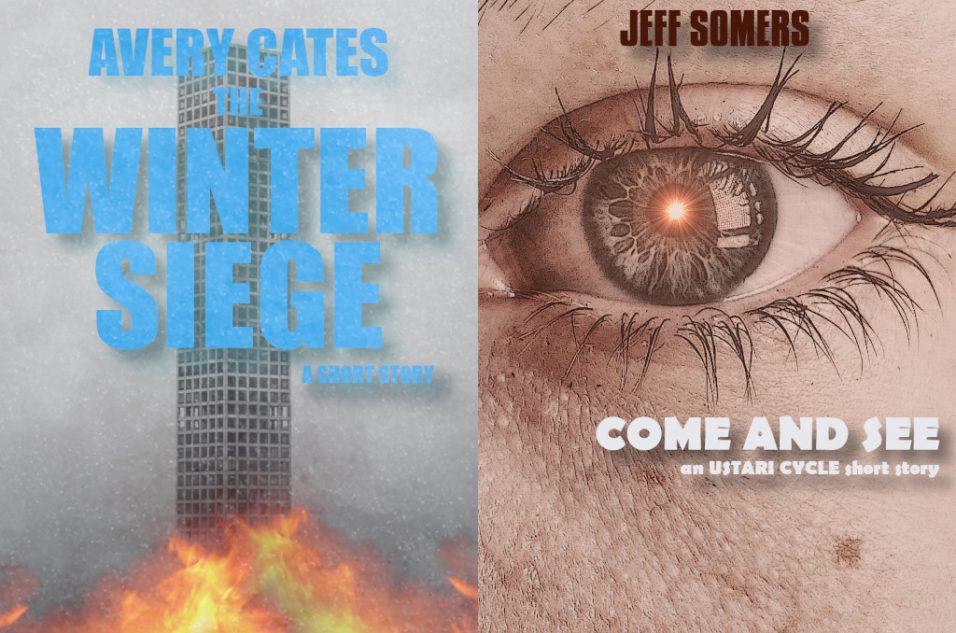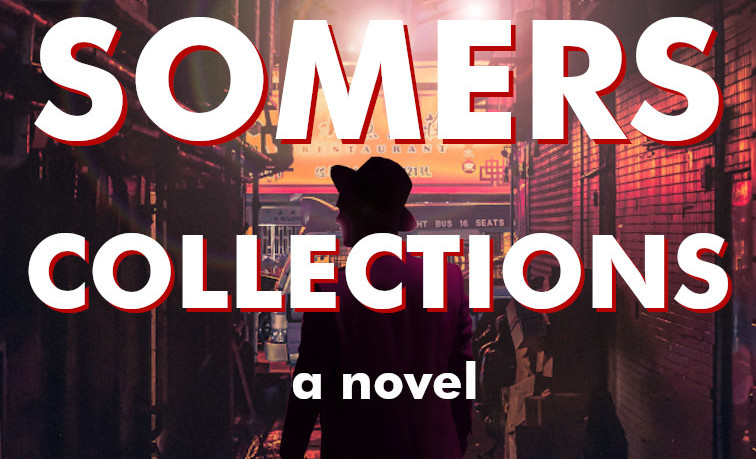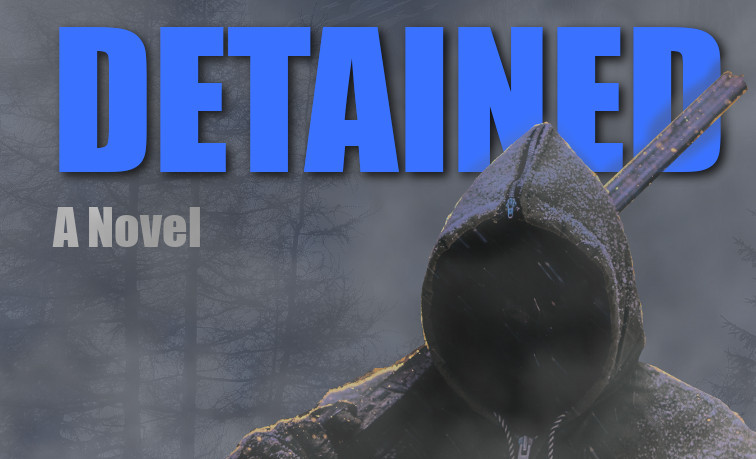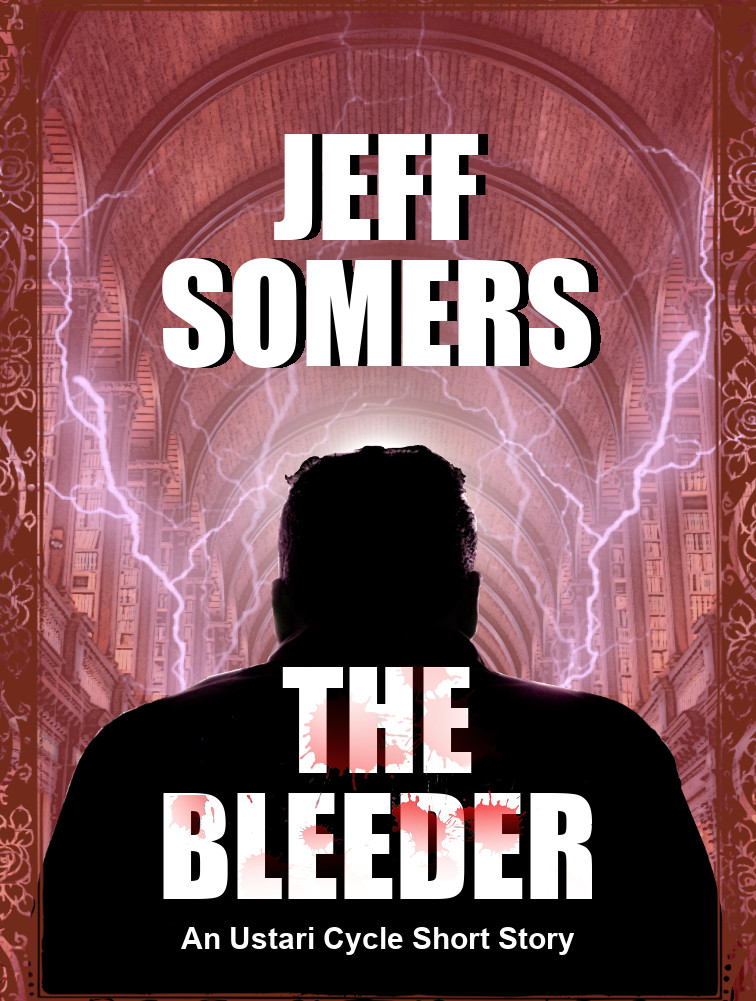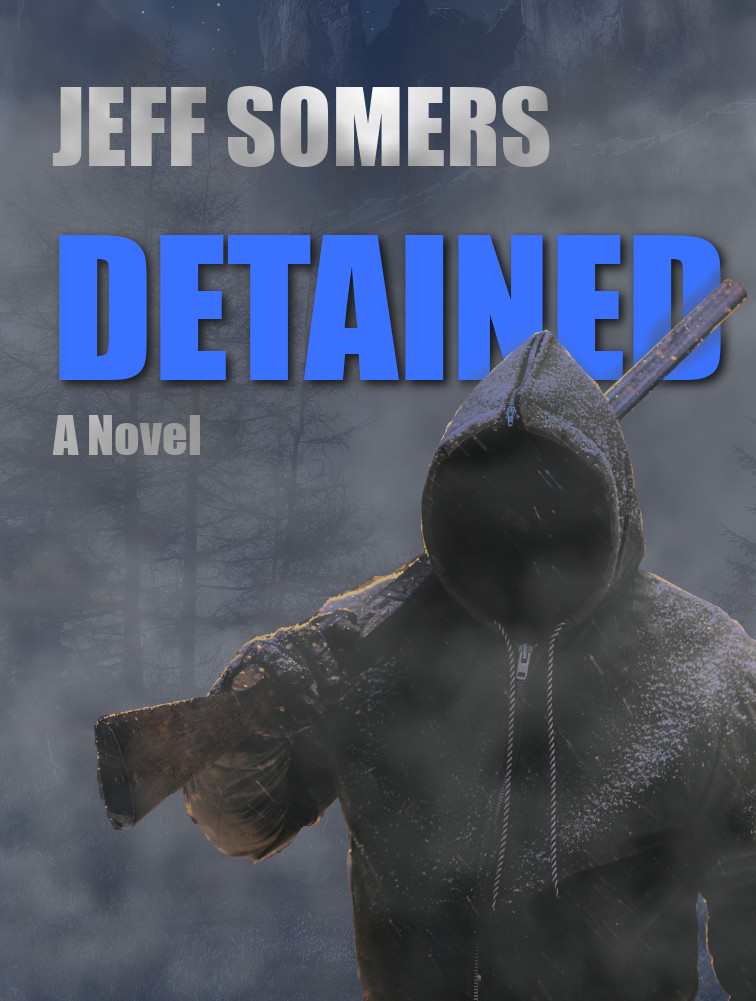I’ll be posting one chapter of my novel Detained every week throughout 2021. Download links below
22. Candace
She turned to follow Mike and Raslowski out the front door. It felt strange to leave the bar, suddenly, like she was exposed. As they walked towards his car, she glanced back at the building, the blazing lights so familiar, still promising the sort of familiar, warm, safe space she wasn’t sure she’d ever experience again. They were heading into the unknown. She was with a man she’d met three hours before and a scientist who was only telling part of what he knew, and apparently the future of the world hung in the balance.
She wondered if she’d ever see the place again. Then she wondered if she had maybe hit her head earlier in the day. Slipped in the shower and was right now half-drowned in the mildewy horror that was the old clawfoot tub. It would explain a lot about her day.
Mike’s Land Rover was an older model, dented and beat up. “This is what transient millionaires drive?” she asked.
He smiled a little as he fished his car keys from his pocket. “New cars get more attention. Expensive new cars get stolen, vandalized, broken into. It’s like people don’t like rich folks.” He shrugged as he unlocked the doors. “Besides, it’s a rental.”
She snorted, grunting as she helped him load Raslowski into the back seat. The physicist cried out in pain several times when the bolt in his shoulder was jostled. When she opened the front door she found the passenger seat piled high with books, notebooks, a battered and abused tablet computer, old-school print maps that had been folded in some sort of mockery of the idea of folding maps, coffee cups, and fast food bags. The scale of the pile stunned her.
As Mike climbed into the driver’s seat he glanced over. “Ah, shit, sorry. Here.”
He leaned over and swept it all out the door and onto the pavement. She laughed a little and climbed in. Why not? she thought. World’s ending anyway, according to Raslowski. And we’re the Four Horsemen.
The fact that there were four of them was, she thought, surely a coincidence? And then she heard her father’s voice, saying it’s just a coinkydink. The old man had been fond of that sort of wordplay, and Candace could remember many times when she’d rolled her eyes at Mr. Cuddyer’s puns. Coinkydink had been one of the better ones.
The drive was quiet and dark, the only sound the engine and the only light his headlights dancing over the trees and the pavement. It was easy to imagine that they were the only people left alive, that the world had ended already, that they had it backwards: The doom was external, and was coming for them.
As they came up on the building, Raslowski sat forward, putting his head between them. He was breathing hard. “Don’t go in the main entrance. Go past and look for a service drive.”
The facility was a one-story building of yellow brick, with mean little windows spaced along the top. There were loading bays on one end, a huge parking lot of cracked blacktop in front, and a small two-story addition on the end with the glass doors of the main entrance. Floodlights had been set up, and still burned brightly, giving the whole place a fake daytime look that reminded her somehow of the Moon Landing photos: Everything looking brittle and overly-lit.
Mike drove past the front gate; it was just chain-link that had been secured with a length of metal chain.
“That’s just for show,” Raslowski said as if reading his mind. “This place is hardened, trust me.”
The service entrance led to the loading docks and was blocked by a similar chain link fence. “Smash it,” Raslowski instructed, and Mike pushed the pedal down and sent the rental crashing through. The noise was a lot louder than she’d expected. If anyone was alive in there, she thought, they knew someone was coming.
“Go past the loading docks and around the back,” Raslowski said. They slipped past the eerie, empty loading bays and turning into the unlit area behind the building. The weeds hadn’t been trimmed back, and it was like driving into a sudden jungle, making the whole installation feel like it existed in a different world, someplace wild and ancient.
“Stop.”
Candace helped Raslowski out of the car while Mike stood guard with the gun.
“Over there,” the scientist said, gesturing with his bound hands. “The door.”
Concrete steps led up to a security door, steel painted green. Candace could see it had a magnetic locking system. A keypad had been installed in the wall next to it. She led Raslowski to the steps and up to the keypad, Mike trailing behind. The silence was almost perfect; aside from the breeze in the overgrown weeds, there were just their own sounds: Their steps on the dry twigs and grass, the soft noise of their clothes. She thought it was oddly peaceful after the violence at the bar.
On the landing just outside the green door, she saw that the keypad had no markings: Just sixteen buttons, four by four, without any indication of their purpose.
“A little help?” Raslowski said, gesturing.
Candace looked at him. She was suddenly conscious of the risks being taken. They’d come out here alone, assuming they knew what the situation was—abandoned facility, one slightly off-balance scientist running around. What if they were wrong? What if it was a trap? She was certain she was the stupidest woman in the world. Of course there would be another squad of soldiers here, probably already on their way to arrest them.
There was nothing for it but to go forward, though. She put her hand on the keypad.
“Top left,” Raslowski said. “Bottom row, second from right.”
She keyed in the buttons as Raslowski called them. There was no indication that anything at all was happening, aside from the plasticky sound of the buttons as she pressed them. Raslowski kept issuing instructions in what appeared to be an endless code that had no numbers or letters, just memorized button positions. After what seemed like the hundredth of them, there was a soft click and the green door sagged inward. Candace stepped aside.
“After you,” she said to Raslowski, and Mike smiled.
They followed him into a dark corridor, pitch black. She fumbled in her pocket and pulled out her phone; the screen showed no signal, but she thumbed on the flashlight and directed it ahead of them, the battery at 33%. The hallway was empty, and led directly to another door that looked a lot less secure.
The green door slid shut behind them, and the sense of being in an enclosed, dark space was overwhelming.
Raslowski reached for the door’s handle, and Mike stepped forward quickly and grabbed his arm.
“No rushing through and locking it behind you,” he said. He turned to look at Candace. “Who knows what dark maze of unfamiliar rooms and corridors is in there.”
She nodded. Carefully, they edged through the door more or less as a group. Candace felt gritty and gross. She wanted a shower and a fresh pair of jeans. She’d settle for some dry shampoo and clean socks.
They were in a small room that was obviously a security office. Four large flat screens were mounted to the wall, and a bank of computers lined two walls to their right as they walked in. Four empty chairs lay chaotically on the floor, as if knocked over in a hurry. Raslowski, with Mike still holding his arm, walked over to the door across the room, paying no attention to the screens. He opened the door and she followed them through, thinking that the place felt empty, if nothing else, and no one had come to shove an AR-15 in her face.
She found herself in a huge room, in boiling heat, buffeted by an incredible humming noise.
The whole building was one massive space, the size of a football field. And it hummed.
“Servers,” a voice said, making her look over her shoulder in surprise. “Possibly the largest cloud of computers in the world, though of course we can’t know for sure because it’s all top secret.”
The new voice belonged to a woman, a young girl in a white lab coat Candace couldn’t possibly believe was worn by any actual scientists. She was tall, wearing a sensible skirt and pink blouse, her bright red hair tied back in a no-nonsense bun that she was instantly jealous of, her own brunette curls always resisting any sort of sensible arrangement. Candace thought she was absolutely gorgeous, albeit the most pale woman she’d ever laid eyes on. She thought that if Legs here turned out to have an advanced degree of some sort she would hate her for life.
“Myra,” Raslowski said, sounding weak and tired, his voice thin and whiny, “they don’t have clearance.”
Mike smirked and raised the gun. “I hate to disagree with you, Doc,” he said. Then he looked at Myra, and Candace hated herself for studying him for any signs of being instantly in love with this tall, skinny girl in cat’s-eye glasses who looked like she knew how to dance—like, really knew. “Myra, is it? Doctor Myra?”
Myra adjusted her glasses. “Well … no. No doctorate for me.”
Good, Candace thought, and felt ashamed.
“Myra is my computer liaison,” Raslowski said. “She speaks machine language and Assembly.”
“Just her here?” Mike said, looking around. They were all sweating. Candace noted the perspiration stains on Myra’s coat with a note of sour triumph. “In this whole big place?”
Raslowski made a face. “We are a need-to-know group,” he said, breathing hard. “Small and efficient was the way to go. And no one knew we were here, Mr. Malloy.”
“Wait,” Myra suddenly said, putting a hand up to her neck and fiddling with a simple gold chain that hung there, “you’re Mike Malloy?” She turned to look at Candace. “And that means you’re … Candace Cuddyer?”
Candace glanced over at Mike and he met her gaze, smiling slightly in a way that felt private and personal and for her and she felt some of her tension drain away. And then she felt like an idiot. She wasn’t going steady with the man. They’d just met, and she was a grown-ass woman, and if Myra had the best-looking legs she’d ever seen and was smart enough to the computer geek on a top secret government project, so what? Candace thought her shoes were ugly, and that was good enough for the moment.
“Well, yes,” Mike said, looking back at her. “Why?”
“You don’t understand,” Myra said, smiling nervously. “The whole project was moved here because of you and Mr. Eastman and Mr. Haggen. We’ve been tracing your threads for months now. You’re, like, the closest thing we have to superstars in here.” The look on her round, pretty face froze and soured. “You know, because—”
“Because we’re supposed to end the world,” Mike said, turning and winking at Candace. “We heard. We don’t believe it, but we heard.”
Candace thought it was interesting, the difference in the story: Raslowski made it sound like they’d moved the operation here because of the location’s simplicity, the lack of variables. Legs had just siad they’d come specifically for them. She wondered if Mike had noticed it.
“Oh, it’s true,” Myra said, pushing her glasses up the bridge of her nose and sounding to Candace’s ears completely and totally sincere. “The model is very clear. The four of you, if you were allowed to go about your business tonight—well, we’re not sure, because the apocalypse is a data dump beyond anything we’ve ever modeled before, frankly. All we know is that you four, in that bar tonight, were the key. Beyond that we couldn’t tell.”
“Myra,” Raslowski hissed.
She looked at him, blinking blankly. Candace thought she must have some sort of spectrum thing going on, as pretty as she was. “Oh, right. I just assumed, since you brought them here, that it was okay.”
“To be fair,” Mike said, holding the gun up. “He didn’t have a choice.”
Myra suddenly seemed to understand what was going on. She looked at Raslowski and frowned. “Are you hurt, Emory?”
He waved a hand dismissively. “Yes, but … it’s a casualty of war. Look, Myra—there have been some developments that have enriched the data set. I’ve agreed to re-run the model to see whether the outcomes have changed.”
“Oh,” Myra said, nodding. Then her eyes widened. “Oh! As in, no end of the world. All right, come on.”
Not as smart as she looks, Candace thought with mean, petty satisfaction.
Myra started walking briskly into the server farm. They followed, slower, Raslowski leaning on Mike and moving at little better than a shuffle. Myra led them through what felt like a maze of humming machines. To Candace they were just black boxes; there were no screens or wires. The heat was incredible, even though she could see the central air ducts every few feet, and could feel the rush of fan-pushed air.
Towards the rear of the building was a metal security door, another unmarked keypad set into the wall next to it. A bright red and yellow sign proclaimed that ONLY AUTHORIZED PERSONNEL BEYOND THIS POINT. Myra punched in the lengthy code and stepped aside gracefully, following them in to a dimly lit, constrictive tunnel. It sloped downward, and Candace became aware of the weight of the world above them and around them. They walked far longer than she thought possible, the downward slope steady. At first the tunnel had been cooler than the server room, but as they sank it grew warm again.
She turned to glance back at Mike. He smiled slightly, gun in hand but pointed at the floor, his index finger alongside the barrel. She tried to decide if it was feminist to admit she liked having him watch her back.
The tunnel ended at another security door, which led to a blindingly white room. It wasn’t terribly large, but it was lit with what felt like several thousand white fluorescent bulbs. The temperature dropped suddenly, and she found herself shivering as they squeezed in. There was a vibration under her feet. The only furniture was a single metal desk with a keyboard and mouse and a chair. A huge screen filled the entire wall across from the desk.
Candace looked around. “What is this place?”
Raslowski sat down in the chair, sweat shining on his forehead. “This,” he said slowly, “is where we change reality.”
EPUB | MOBI | PDF
